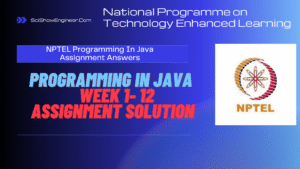Looking for NPTEL Programming in Java – Week 1 Assignment Answers?
You’re at the perfect place! We’ve got you covered with accurate, updated, and trustworthy solutions for Week 1 of the NPTEL Java course. Whether you’re double-checking your work or need help understanding the concepts, these answers will guide you through the assignment with clarity and confidence.

Programming In Java
With the growth of Information and Communication Technology, there is a need to develop large and complex software. Further, those software should be platform independent, Internet enabled, easy to modify, secure, and robust. To meet this requirement object-oriented paradigm has been developed and based on this paradigm the Java programming language emerges as the best programming environment. Now, Java programming language is being used for mobile programming, Internet programming, and many other applications compatible to distributed systems. This course aims to cover the essential topics of Java programming so that the participants can improve their skills to cope with the current demand of IT industries and solve many problems in their own filed of studies.
PREREQUISITES : This course requires that the students are familiar with programming language such as C/C++ and data structures, algorithms.
INDUSTRY SUPPORT : All IT companies.
COURSE LAYOUT – Click To Know More
Nptel Programming in Java Week 1 Assignment Answers
Que. 1) Which of the following is true?:
a) Java uses only interpreter.
b) Java uses only compiler.
c) Java uses both interpreter and compiler.
d) None of the above.
View Answer
Que. 2) A Java file with extension ‘class’ contains:
a) Java source code
b) HTML tags
c) Java Byte code
d) A program file written in Java programming language
View Answer
Que. 3) Which of the following is not an object-oriented programming paradigm?:
a) Encapsulation
b) Inheritance
c) Polymorphism
d) Dynamic memory allocation
View Answer
For Latest Update Join our official channel: Click here to join
Que. 4) Java is a platform-independent programming language because:
a) It compiles an intermediate code targeting a virtual machine, which can be interpreted by an interpreter for a given OS.
b) The Java compiler translates the source code directly into the machine-level language.
c) It follows the concept of “write once and compile everywhere”.
d) It is written almost similar to the English language.
View Answer
Que. 5) Which of the following is not a Language Processor?:
a) Assembler
b) Compiler
c) Interpreter
d) Fortran
View Answer
Que. 6) A platform is the hardware or software environment in which a program runs. Which of the following is/are Java platform component(s)?:
a) HTML
b) Java Virtual Machine
c) JavaScript
d) Hotlava
View Answer
Que. 7) What is the correct sequence of steps to execute a Java program?:
a) Run → Edit → Compile
b) Edit → Run → Compile
c) Compile → Edit → Run
d) Edit → Compile → Run
View Answer
Que. 8) What is the primary difference between javac and java commands?:
a) javac is used to edit Java code, while java runs Java programs.
b) javac compiles Java source code to bytecode, while java executes the bytecode on the JVM.
c) javac executes Java programs, while java is used for compilation.
d) Both are used for compiling Java programs.
View Answer
Que. 9) Which of the following is not a feature of Java?:
a) Platform Independence
b) Object-Oriented Programming
c) Supports Explicit Pointers
d) Supports Polymorphism
View Answer
For Latest Update Join our official channel: Click here to join
Que. 10) What is the output of the following code?
class NPTEL {
public static void main(String[] args) {
System.out.println("Hello, World!");
}
}
a) Hello, World!
b) HelloWorld!
c) Compilation Error
d) Runtime Error
View Answer